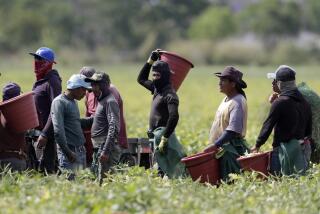U.S. Bolsters Labor Charge Against Unocal
- Share via
Allegations that forced labor was used in the early stages of a Unocal Corp. pipeline project in Myanmar have “substantial credibility” based on the “preponderance of evidence,” according to a new report by the Department of Labor.
The report says such allegations fell sharply in late 1996 after criticism of the Unocal project surfaced. But it also cited a U.S. Embassy source stating it was “plausible” that the military battalions guarding the pipeline are still using forced labor.
The report, fresh ammunition for critics trying to force Unocal out of Myanmar, formerly known as Burma, has touched off a bitter dispute between Unocal and the Labor Department.
In a letter to Labor Secretary Alexis Herman on Sept. 30, Unocal accused the department of misusing taxpayer funds and abusing “departmental power and authority” by publishing the report, which was written in consultation with the State Department.
Unocal asked Herman to investigate its charge that the report is biased because one of the authors, Doug Steele, is a well-known critic of Myanmar. The government of Myanmar is a partner in the $1.2-billion pipeline along with Total, the French energy company.
Andrew Samet, deputy undersecretary for international affairs at the Department of Labor, denied those charges and said the Myanmar report was a “fair and accurate description of a very troubling human rights situation in Burma” and the conditions at the Yadana pipeline.
Samet said Steele was one of three consultants hired to work on the 111-page report and that his work was reviewed and approved by numerous government officials. He also noted that his staff was unable to conduct independent research in Myanmar because the government denied visas for two of the three staffers.
As evidence of violations, the report quotes a Singapore-based Unocal official telling a U.S. Embassy officer in January 1996 that “the rate at which these workers run away has decreased sharply” since the company began paying the workers directly rather than going through the government.
The report commented that if workers on the project had to “run away” that might indicate they were not working voluntarily.
Human rights activists hailed the Labor Department report, which was delivered to Congress last month. It is the latest of several critical studies on forced labor in Myanmar and the Yadana pipeline, but the first with the imprimatur of the Clinton administration.
“This . . . shows clearly that the allegations are not irresponsible,” said Robert Benson, a Loyola Marymount University law professor and backer of an unsuccessful campaign to get Unocal’s corporate charter revoked by the state of California .
The Labor Department report was cited Tuesday when a Los Angeles City Council committee approved an ordinance prohibiting companies doing business in Myanmar from receiving city contracts. The proposed ordinance--which was forwarded to the full council--is similar to the selective purchasing laws passed by 22 other U.S. cities and states.
El Segundo-based Unocal called the Labor Department report “scurrilous” and “unsubstantiated” and vehemently denied that forced labor was ever used on the construction of the pipeline project.
The company acknowledges the military may have forced villagers to serve as porters or in other support roles in the inital phase of the project, but said it has since demanded that anyone associated with the pipeline is working voluntarily and is paid.
The government of Myanmar is a partner in the pipeline project, and Unocal pays the military to provide security for the pipeline.
Unocal has stressed it has no control over what the military does outside the pipeline region. But Barry Lane, a Unocal spokesman, said the pipeline operators have made a “concerted effort” to ensure that all villagers hired by the military guarding the pipeline be paid.
Lane said Unocal’s insistence on strict labor standards in Myanmar has substantially improved working conditions in the area.
“Rather than sitting there taking snipes at us, these activist groups should be embracing what we’re doing,” he said.
As the largest U.S. investor still operating there, Unocal has been the target of an international campaign designed to undermine Myanmar’s aging rulers, who wrested control of the country in a bloody coup in 1988 and refused to relinquish power after the opposition led by Nobel laureate Aung San Suu Kyi won a national election in 1990.
The Clinton administration has initiated some of the toughest sanctions against the repressive regime, including last year’s implementation of a ban on new U.S. investment. A campaign by human rights activists has led to the pullout of dozens of U.S. firms from Myanmar.
Myanmar’s military leaders deny that they force their people to work without pay. They argue that their people contribute their labor because of a religious belief in the importance of volunteerism.
But the Department of Labor report cites numerous instances where villagers, including children and elderly, claim they were forced to work under inhumane conditions. That included being placed at the heads of military columns to detonate mines and booby traps and spring ambushes.
The report identified more than 80 major infrastructure projects--including roads, dams, airfields and tourism development projects--that were built with what the Myanmar officials call “voluntary labor.”
Similar findings were included in a report on Myanmar issued in July by a special commission appointed by the International Labor Organization, a United Nations-affiliated body monitoring global labor issues. That report states that the government of Myanmar and the military “seem oblivious to the human rights of the people and are trampling on them with impunity.”
More to Read
Sign up for Essential California
The most important California stories and recommendations in your inbox every morning.
You may occasionally receive promotional content from the Los Angeles Times.













